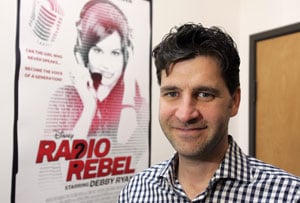
On a Friday evening last month, a Disney Channel original movie made child’s play of cable competition for viewers ages 2 to 14.
Many pinned the appeal of the movie, “Radio Rebel,” to up-and-coming star Debby Ryan, who plays an outcast finding her way in high school by anonymously hosting an Internet radio show.
But even as fans have heaped praise on the starlet, the premiere was no less momentous for MarVista Entertainment, which co-produced the movie. Once a bit player in Hollywood, the Mar Vista company is seeing heavy investment in production pay off.
“We’re in expansion mode,” said MarVista Chief Executive Fernando Szew, an executive producer on “Radio Rebel.”
For about a decade, the company has been active in selling rights for TV movies and series to overseas networks, mostly for content produced by third-party companies. Among its highest-profile deals is one struck in 2010 with Saban Capital Group in Century City to handle international distribution of “Power Rangers Samurai,” a new version of the children’s series that made media titan Haim Saban his first fortune.
More recently, the company has been making deals on the production side. Last August, it received an undisclosed sum of capital from San Francisco private-equity investor Brian Sheth to help boost output of series and made-for-TV movies. A few years ago, the company started producing two or three annually and now would like to raise that to as many as a dozen.
Jeffrey Hardy, an analyst at Portland, Ore., consultancy Film Profit said investing more in the production stages makes sense for a distribution company like MarVista.
“It’s a good way to go, because you want to control your content,” Hardy said. “A company that makes its income through acquisitions is at the whim of the quality of the content that is available.”
Grand wishes
Szew got into the movie business at his father’s distribution company, Whamo Entertainment, soon after graduating from college in the late 1990s. Szew started MarVista in 2003; that same year, he and his father, Joseph, merged their companies with the goal of getting into production.
The duo decided to target the niche of family-oriented made-for-TV movies given the relative low costs of production.
“The barrier to entry was something we could surmount even when we didn’t have great capital structure,” Fernando Szew said, noting many productions have budgets between $2.5 million and $5 million.
Among early efforts were 2006 Lifetime Channel drama “Night of Terror” and 2005 ABC Family drama “Christmas in Boston.” MarVista’s first co-production with the Disney Channel, “16 Wishes,” came in June 2010. The movie was one of Debby Ryan’s early leading roles and drew 5.6 million viewers for its premiere, beating all other cable TV offerings in its Friday evening time slot.
“Everybody perceived it as a great test run,” Szew said. “Our relationship with Disney grew after ‘16 Wishes’ and the success of Debby got solidified.”
Soon after, Disney approached MarVista with a script for “Radio Rebel,” an adaptation of popular teen novel “Shrinking Violet.” Disney had already signed Ryan to star and Szew jumped at the chance to invest an undisclosed amount. Shot in Canada, it was co-produced by Two 4 the Money Media in Vancouver.
After last month’s debut, which drew 4.3 million viewers, MarVista is overseeing merchandising efforts and foreign sales for the movie. As an investor in the production, the company can profit from merchandise sales, ancillary revenue not often shared with pure distributors. The company hired Culver City branding firm Brand Sense Partners to develop a product line, including bracelets, notebooks and hair accessories.
Also, the soundtrack was licensed to New York recording company Razor & Tie with domestic home distribution being handled by Image Entertainment in Chatsworth.
Next month, MarVista plans to sell many of the movie’s international home entertainment rights at the MIPTV conference in Cannes, France.
International strategy
Thus far, the company has produced about 40 TV movies. It also acquires about 20 finished TV movies and series a year, a number Szew is looking to increase.
To lead the efforts, he has been hiring executives, including two more earlier this month. The company now has 22 employees, about one-third more than a year earlier.
As MarVista looks to produce more content, its timing couldn’t be better. Foreign sales, once a secondary market to domestic rights, are now a more lucrative market for many U.S. TV shows.
Elie Dekel, president of Saban Brands, Saban Capital’s entertainment licensing division, noted that the value of international rights for the new incarnation of “Power Rangers” surpasses that of domestic rights.
“It’s critically important,” Dekel said. “If you look at international as a total business, the aggregate exceeds what you do in the U.S.”
